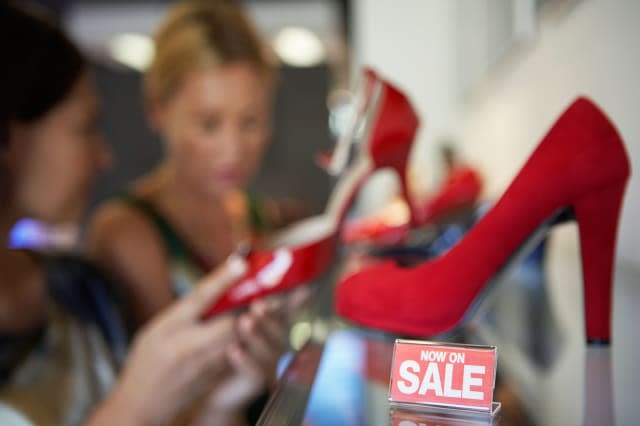We value bargains more than friendships

Our obsession with discounts and bargains has reached fever pitch. A new study found that people were happier after buying something for less than half the original price in a sale than they were when hanging out with their friends.
Philip Graves, who wrote the bestselling book 'Consumer.ology', analysed the effect shopping has on people's happiness and compared it to other aspects of their lives. He interviewed over 2,000 people, and asked them to rate how specific things made them feel - from 1 (no different from normal) to 10 (incredibly happy).
Unsurprisingly, the study, for Privilege Insurance, put some of the more meaningful things at the top of the pile - with 'being on holiday' and 'spending time with family' joint first - followed by 'falling in love'.
However, this was followed by 'being given something for free', and 'buying something for less than half price'. Both of which came ahead of 'spending time with friends', and 'finishing a project around the home'.
Also in the top ten were 'buying something for half price' (at number 7), 'getting a better deal by shopping around' (at 8) and 'finding something you love in a sale' (10).
Why are we obsessed?
%VIRTUAL-ArticleSidebar-shopping%
It shows how years of financial stress have focused our minds on discounts. It's one reason why online Black Friday sales soared, then the high street suffered until the Boxing Day sales kicked in.
There a number of factors at work here. One of them is that buying things makes us feel good. In tough times, that's offset by the guilt of spending money. Buying in a sale allows us to focus not on what we're spending but on what we're saving - so we only experience the positive effects of shopping.
There's also the fact that in hard times we become more focused on value. We find it hard to put value on things, and can only really do so by comparing them to something else. The sale comes in handy here, because the 'previous price' offers us a value comparison, which makes us feel good about what we're buying.
Then, of course, is the fact that we have now lived through 12 months of falling prices, so people are more likely to put off buying something until it's cheaper - unless the store offers them a big enough discount to persuade them to buy now.
Suspicious consumerism
Graves said the same factors had led to a growth of what he is calling 'suspicious' consumerism - where we always check for vouchers and deals (and compare prices) before we buy. The study found that 47% of people always price check before buying, while 31% search for vouchers, and 28% use price comparison sites.
He named Liverpool as the shopping-around capital - where 85% of people price-check before buying. This was followed by Bristol at 84%, Nottingham at 81%, and Leeds and London at 80%.
He explains: "Technology makes it easy for us to check prices and we've been conditioned by the large number of discounts used by retailers and the ever-present 'Enter voucher code' box on websites to question whether we could be paying less. Studies show that our habits form when there is an easy route to feeling good combined with a variable level of reward: the fact that we don't always find a deal actually means that, when we do, it feels better and makes it more likely we'll try again in the future."





